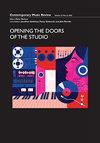即兴创作/不确定性
IF 0.1
2区 艺术学
0 MUSIC
引用次数: 0
摘要
即兴和不确定性似乎是一致的术语,两者都与接受偶然性和对意外的开放有关。我们可以在即兴创作研究中找到各种关于偶然性的讨论。例如,丹·迪皮耶罗(Dan DiPiero)提出了一个有用的简单定义,即即兴创作是一种“偶然遭遇”,其中偶然性是一个总称,暂时跨越了未知和本来可能发生的情况(2012,2)。同样,加里·彼得斯(Gary Peters)强调,即兴创作的特点是“在偶然的背景下,没有绝对的标准,因此所有结果本质上都是不确定的”(2012,2)。音乐中的不确定性与约翰·凯奇的作品以及他对“实验音乐”的理解的发展联系在一起。乍一看,迪皮耶罗和彼得斯的即兴创作概念与凯奇对实验行为的著名定义是一致的:“不是……这是一种稍后将以成功和失败来评判的行为,而只是作为一种结果未知的行为”(1961,13)。但是,即兴创作和不确定性的术语是如何被运用的,以及与之相关的音乐实践,并不总是能证明这种一致性。即兴和不确定性之间的联系和分歧仍然是一个开放的研究领域。本期《当代音乐评论》特刊由Franziska Schroeder、Koichi Samuels和Rebecca Caines编辑,主题为“即兴创作与社会包容”,从第38卷第5期开始。这个问题强调了如何通过即兴研究领域以及各种各样的实践努力,即兴演奏已经远远超出了传统音乐领域的价值,成为思考扩展包容性,多样性和访问概念的工具,以及在不同的表演实践中参与更广泛的社会,文化和政治问题。这期文章的任务是研究即兴创作如何使我们能够探索新的包容和社会组织模式(Schroeder, Samuels, and Caines 2019, 442)。即兴创作被广泛理解当代音乐评论,2021卷40,第4期,359-365,https://doi.org/10.1080/07494467.2021.2001934本文章由计算机程序翻译,如有差异,请以英文原文为准。
Improvisation/Indeterminacy
Improvisation and indeterminacy seem to be aligned terms, both being associated with an acceptance of contingency and an openness to the unexpected. We can find diverse discussions of contingency across improvisation studies. Dan DiPiero, for example, usefully proposes a simple definition of improvisation as a ‘contingent encounter’, where contingency stands as an umbrella term temporally spanning the not-yet-known and the could-have-been-otherwise (2018, 2). Similarly, Gary Peters highlights that improvisation characterises choices ‘within a contingent context, without absolute criteria, where all outcomes are thus intrinsically uncertain’ (2012, 2). Meanwhile, indeterminacy in music is most associated with the work of John Cage and with the development of his understanding of ‘experimental music’. DiPiero’s and Peters’s conceptions of improvisation are at first glance congruent with Cage’s famous definition of the experimental act: ‘not [...] an act to be later judged in terms of success and failure, but simply as of an act the outcome of which is unknown’ (1961, 13). But how the terms of improvisation and indeterminacy have been deployed, and the musical practices they have been associated with, has not always borne this congruence out. The connections and divergences between improvisation and indeterminacy remain an open area of inquiry. This special issue of Contemporary Music Review follows from volume 38, issue 5, on the theme of ‘Improvisation and Social Inclusion’, edited by Franziska Schroeder, Koichi Samuels, and Rebecca Caines. That issue emphasised how, through the field of improvisation studies alongside a wide variety of practical endeavours, improvisation has come to take on a valence far beyond its traditional musical domain, becoming a tool for thinking through notions of exand in-clusion, diversity, and access, as well for engaging with wider social, cultural, and political issues, in diverse performance practices. The essays included in that issue took as their task examining how improvisation can enable us to explore new modes of inclusion and social organisation (Schroeder, Samuels, and Caines 2019, 442). Improvisation was widely understood Contemporary Music Review, 2021 Vol. 40, No. 4, 359–365, https://doi.org/10.1080/07494467.2021.2001934
求助全文
通过发布文献求助,成功后即可免费获取论文全文。
去求助
来源期刊

Contemporary Music Review
MUSIC-
CiteScore
1.00
自引率
25.00%
发文量
48
期刊介绍:
Contemporary Music Review provides a forum for musicians and musicologists to discuss recent musical currents in both breadth and depth. The main concern of the journal is the critical study of music today in all its aspects—its techniques of performance and composition, texts and contexts, aesthetics, technologies, and relationships with other disciplines and currents of thought. The journal may also serve as a vehicle to communicate documentary materials, interviews, and other items of interest to contemporary music scholars. All articles are subjected to rigorous peer review before publication. Proposals for themed issues are welcomed.
 求助内容:
求助内容: 应助结果提醒方式:
应助结果提醒方式:


